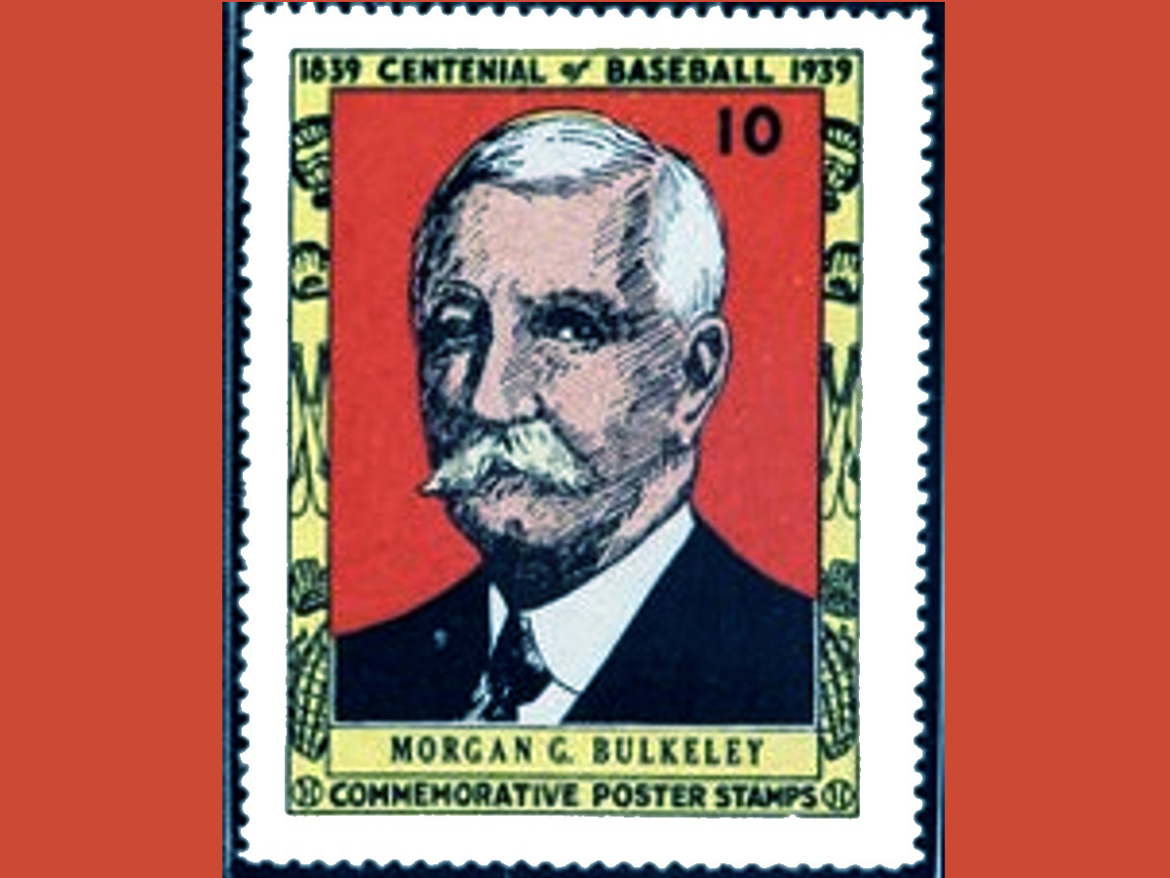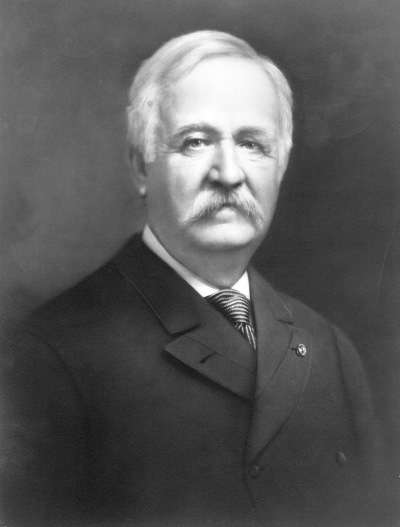lSuccess came easily to Morgan Bulkeley, but still he had to crowbar his way into the Connecticut governor’s office. Literally.
He ran for governor of Connecticut and mayor of Hartford at the same time he was president of the Aetna Life Insurance Co. Bulkeley also founded a baseball team and a bank and got himself elected to the Baseball Hall of Fame.
“He was shrewd, pragmatic, sometimes wildly vindictive–but he was also courteous, loyal and even kind,” wrote his biographer Kevin Murphy. “He wasn’t a “man for all seasons,” but he accomplished an enormous amount without receiving even a high school diploma.”
Morgan Bulkeley
Bulkeley was born Dec. 26, 1837, in East Haddam, Conn., a Mayflower descendant and scion of a wealthy family. When he was eight years old his father, Eliphalet Bulkeley, moved to Hartford so he could co-found the Aetna Life Insurance Co. He hired Morgan and his brother Charles to sweep the floors for $1 a day.
The Bulkeleys were relatives of Wall Street tycoons Junius and J.P. Morgan, but it was J.H. Morgan in Brooklyn for whom Morgan went to work. He started out as errand boy and rose to salesman. When the Civil War broke out, Morgan and Charles enlisted. Charles lost his life; Morgan survived and went back to Brooklyn.
Morgan Bulkeley, Reluctant NL President
When Morgan Bulkeley was 35 his father died, and he returned to Hartford. There he helped organize the United States Bank of Hartford and served as its president. In 1874, he also founded the Hartford Dark Blues, a baseball team that fielded the inventor of the curveball, Candy Cummings. Another star: switch-hitting infielder Bob ‘Death to Flying Things’ Ferguson.
When the National League was formed in 1876, Morgan Bulkeley became its first president. He warned he would only serve for a year because of his interests in business and harness racing. Bulkeley kept to his promise, but he did help the game’s reputation by discouraging gambling, drinking and rowdiness. He also moved the team to Brooklyn, having decided Hartford couldn’t support a major league baseball team. The Dark Blues became the Brooklyn Hartfords.
In 1879 he became president of Aetna after his father’s successor resigned. (He would increase the company’s assets eightfold.) Morgan Bulkeley had also taken up politics in that time, getting elected to Hartford’s Common Council and Board of Aldermen.
In 1880 he ran for mayor and governor simultaneously, winning only the mayor’s race. He paid for steamboat rides for poor Hartford children out of his own pocket. As a 47-year-old mayor, he married 24-year-old Fannie Briggs Houghton who came from a prominent San Francisco family. They had two sons and a daughter.
Crowbar Governor
In 1888, Morgan Bulkeley ran for governor as a Republican in a bitter contest. He got fewer votes than the Democrat, but several minor candidates had also run and deprived both front-runners of the required 50 percent plus one votes. The General Assembly chose the winner. Since it had a Republican majority, Bulkeley became governor.
He was term-limited in 1890 and didn’t run for re-election. But the vote for a successor was so close and so tainted by irregularities that election officials refused to certify the results. The Republicans had won the House and the Democrats the Senate, and they couldn’t agree on a governor. Bulkeley wouldn’t relinquish the governorship to either candidate, exercising his constitutional prerogative to stay in office until the election was decided. When the Democratic comptroller locked the door to his office, Bulkeley ordered a crowbar and had the door forced open.
Aetna’s Loan
For two years, the General Assembly refused to appropriate any funds to the state government, and Bulkeley had to borrow it from Aetna. By then, the company had the resources to lend it. He had added new lines of insurance, increased its assets from $25.7 million to $207 million and its employees from 29 to 1,500.
Ultimately the Supreme Court ruled him the legitimate governor and the Legislature voted to reimburse the Aetna. The nickname ‘Crowbar Governor’ would stick with him for life.
He went on to win election to the U.S. Senate, part of the ‘Millionaires’ Senate’ of the Class of 1906. That year, members of an African-American battalion, the 24th Infantry Division of Brownsville, Texas, was accused of rioting. No infantryman testified against his comrades, but President Theodore Roosevelt dismissed the entire division with a dishonorable discharge. Sen. Morgan Bulkeley was one of the few who spoke out against Roosevelt’s action.
He died in Hartford at 84 on Nov. 6, 1922, still president of Aetna. His nephew Morgan Brainard took over as president for the next 35 years. In 1937, Ban Johnson was elected to the Hall of Fame as the first head of the National League. It was decided the first president of the National League should be inducted, too, and Morgan Bulkeley became the first and only Civil War veteran elected to Baseball’s Hall of Fame.
With thanks to Crowbard Governor: The Life and Times of Morgan Gardner Bulkeley. This story was updated in 2023.


4 comments
Thank you very much for this story, for more than a dozen years I’ve had a signed photo of Morgan Bulkeley that remained unidentified due to an indecipherable signature. I instinctively knew he was important by the reputation of the Washington D.C. studio, and so the portrait leaned against a wall in my study waiting for a bolt of light to reveal just who he was. The photo in your article was that bolt of light and my signed photo surely dates from the time he was a U.S. Senator.
[…] 1876 the Hartford Dark Blues became part of the new National League. Candy Cummings pitched the team to two victories over the […]
[…] president, the group originally chose Eliphalet's uncle Nathaniel, a mayor of Hartford and congressman. With the insurance company struggling, these men turned to Eliphalet to take over the […]
[…] the fall of 1871, Governor Jewell faked a telegraph from his opponent, James English, that made it look like English was […]
Comments are closed.